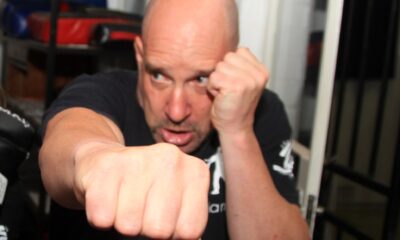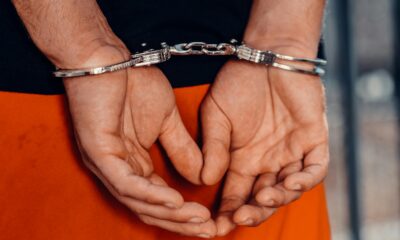
News

Lifman murder leaves void in Cape underworld
Mark Lifman, 57, a notorious figure long embedded in Cape Town’s underworld, has met the same fate he once seemed to defy. Gunned down outside a busy shopping mall in George last Sunday, 3 November, Lifman’s murder has intensified intrigue over the murky world of organised crime he was so deeply involved in yet strongly denied being a part of.
Known for his well-built, polished look and well-guarded presence, the man who moved within the depths of the city’s criminal landscape is gone, leaving a temporary void in South Africa’s shadowy networks and raising questions about who will step in to claim his position, if they haven’t already.
His death has reignited fascination in the life he led, a world reminiscent of a sordid mafia movie, with protection rackets, shifting alliances, shadowy dealings, and a cast dominated by villains. He had fancy homes in affluent Fresnaye and Fancourt in George along with flashy cars, a rumoured penchant for good-looking young men, and a sense of privilege. A life with the veneer of glamour but underneath, one filled with unethical choices, criminal activity, and the inevitable consequences that come with living on the edge.
He started out innocently enough, said those close to him, making sweets in his mother’s kitchen and displaying early entrepreneurial flare. After a few years, he led a life of high-stakes business with criminal associations, a combination that ultimately caught up with him, said a Johannesburg acquaintance who wished to remain anonymous.
In short, Lifman was well acquainted with the inside of a court room, with numerous appearances over the years for a range of offences. Though frequently labelled a criminal kingpin, a title he neither sought nor accepted, there’s no denying that his life was colourful enough to warrant a place in at least three books on crime in South Africa, namely, Jacques Pauw’s The President’s Keepers, Mandy Wiener’s Ministry of Crime An Underworld Explored; and Caryn Dolley’s The Enforcers – Inside Cape Town’s Deadly Nightclub Battles.
Ryan Cummings, security analyst at Signal Risk, tweeted, “Lots of speculation regarding what implications Mark Lifman’s death may have for Cape Town’s underworld. In my humble opinion, Lifman’s influence had diminished in recent years as he faced many legal embattlements which rendered him a possible liability to his counterparts.”
He told the SA Jewish Report, “It’s important to note that Lifman was never cited as being an actual gang leader nor leading any of the operational side of organised crime. The allegations against him were more centred on alleged illicit money laundering schemes and tax evasion. Consequently, his death shouldn’t leave any vacuum which would lead to intensive inter-gang violence which would follow the death of a prominent gang leader per se.”
A seasoned entrepreneur, Lifman dabbled in diverse fields – sweets, fashion, taxis, property, horse racing, night clubs, and private security, all industries marked by high-risk and, in his case, frequent controversy. Allegations of criminal involvement were often tied to his security operations and racing interests.
Born and raised in Cape Town, Lifman’s business dealings often brought him to Johannesburg. He was seen playing padel at the Discovery Padel Park Sandton and lunching with acquaintances at upmarket venues like Olives & Plates at Embassy Towers or Tashas LXX close by, always accompanied by his bodyguard.
Lifman came from a conventional Jewish family and grew up in Rondebosch with his two sisters before moving closer to Sea Point.
As chronicled in Wiener’s book, he attended Sea Point Boys High School, where he was active in sport. According to a distant Cape Town acquaintance, Lifman’s late father, Jeffrey, was a businessman, while his mother, Rina, enjoyed playing golf at the King David Mowbray Golf Club and bridge.
It’s understood that his parents, who later moved to Bantry Bay, were heartbroken by their son’s alleged criminal double life.
At the time of his death, Lifman was out on bail in a murder trial. He was awaiting a court appearance in the Western Cape High Court, where he faced charges with others for the high-profile 2017 murder of Brian Wainstein, an international steroid smuggler wanted by United States authorities. Released on bail, Lifman was due back in court on Monday, 4 November, the day after he died in a parking lot. Two suspects, Johannes Jacobs and Gert Bezuidenhout, were arrested for Lifman’s murder within hours of the shooting. They appeared briefly in the George Magistrate’s Court on Tuesday, 5 November, and are expected back again next week.
One source told the SA Jewish Report that at least one of the alleged shooters was known to Lifman, and may have worked for the same protection company that Lifman himself helped set up some time ago.
Lifman’s former attorney, well-known criminal lawyer William Booth, expressed surprise at the circumstances of Lifman’s death, particularly as he had been alone when he was killed. “Mark took his personal safety extremely seriously,” Booth told the SA Jewish Report. “He was always surrounded by bodyguards, so one wonders why he was alone at the time.”
One of Lifman’s acquaintances who knew him during his youth in Cape Town, said, “He came across as a regular guy, but you could sense there was a volatile streak. He was friendly, but there was something unpredictable about him.” A Johannesburg acquaintance remarked, “He was a likeable guy, charming even, but obviously he was someone you’d never go into business with. People were scared of him. When he spoke, people listened.”
Though no longer his lawyer, Booth recalled Lifman as a complex figure, a talented businessman with a gentlemanly demeanour and an eye for opportunity, yet one drawn to high-risk circles. Booth once asked Lifman why he couldn’t just be content with being “a good Jewish businessman”.
Lifman’s sisters, Enid and Gill, declined to comment on the funeral arrangements, confirming only that he didn’t practice his faith, and that the family intended to keep his burial arrangements private.











Tom
November 9, 2024 at 3:08 pm
He was a bloody paedophile!! And a murderer!! I personally know of a 16 year old boy and his girlfriend who was provided drugs by this savage brute in exchange for sex with both of them. Have the guts and the ethics to tell it like it is, without bias to the fact that he is Jewish. Shame on you
Roger
November 9, 2024 at 3:31 pm
And the allegations of him being a Murderer and a paedophile? Tell it like it is. Such biased, unprofessional and unethical reporting. Sad, but such reporting only fools a very minor part of our population